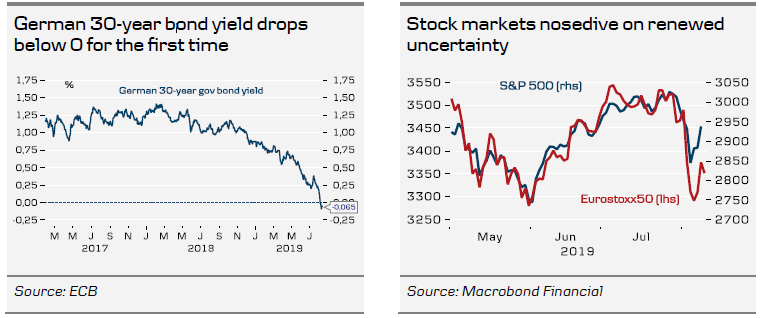Market movers ahead
Summer wrap-up
Focus

Market movers
Global
Scandi
In Denmark, July CPI inflation is due on Monday. We expect a further decline to 0.3% from 0.6% in June. A key (temporary) factor is the 30% increase in prices for package holidays in July last year, which will exit inflation along with a big rise in food prices. More lasting effects will come from the adjustment of the PSO tariff on electricity, which will now be zero in Q3. The remaining district heating plants that did not hike prices in January, when a government subsidy for plants producing electricity was removed, will be adjusting their prices in July. There is some uncertainty connected to this, but we do not expect a price correction anywhere near the 8% increase we saw in January. Clothing prices remain a joker in the pack, as we have seen a steep downward trend this year. After another surprisingly big drop in June, we expect a more muted decrease in July.
On Thursday, Statistics Denmark publishes its first estimate of Q2 GDP growth in the form of its GDP indicator. Exports had another strong quarter considering the weak growth in export markets. This is also supported by solid industrial production, which we know is used directly in the calculation of this first estimate of GDP growth. Private consumption, on the other hand, will pull the other way in a quarter where car sales came back down to earth after record-high sales in Q1. We predict GDP growth of 0.4%.
Swedish June CPIF inflation is expected to stay more or less unchanged at 1.6 % y/y. According to our forecast, inflation will stay slightly on the high side of the Riksbank’s forecast for the next couple of months. For instance, we think there is some further upside in food and clothing prices, partially reflecting lagged effects of SEK weakness. Having said that, CPIF-inflation has peaked for now and to the extent that the next few numbers will offer the RB some relief it is likely to be only temporary.
Prospera publishes new inflation expectation survey data. This time the monthly survey only covers the money market. Some Riksbank board members have mentioned the fact that inflation expectations show some tendency of declining but so far not to an extent that is cause for alarm. Still these data deserve attention going forward keeping in mind that too low inflation expectations some years ago were the reason why the RB moved into negative rates and QE.
In Norway, Norges Bank has a rate-setting meeting on Thursday. Although this is one of its ‘interim’ meetings, with no press conference or monetary policy report, and we do not expect any change to interest rates, the meeting is still attracting greater interest than usual. In June, the bank went to great lengths – both in its interest rate projections in the monetary policy report and at the press conference – to signal that a rate increase was likely in September. On the face of it, then, we would expect this to be confirmed in the press release following the upcoming meeting. However, global risks have increased since the June meeting, and Norwegian data have been slightly disappointing. There will not therefore be any need for the bank to commit itself yet to raising rates in September. Instead, we expect Norges Bank to reiterate its message from June that ‘the policy rate will most likely be increased further in the course of 2019’. This would keep the option of a September hike open while giving the bank scope to postpone if the current uncertainty persists or worsens. That said, we still expect the bank to hike in September. The week also brings data for wages in Q2. After picking up gradually since 2016, wage growth has shown some signs of accelerating over the past two or three quarters. This ties in well with reports of firms having increasing problems sourcing skilled labour and is normally a sign of a labour market that is getting seriously tight. We therefore expect wage growth to climb further from 3.2% y/y in Q1.
To read the entire report Please click on the pdf File Below..
